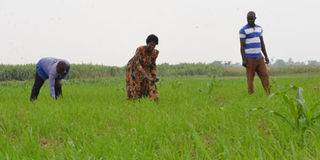Rice imports hurt local farmers, undermine food security

Rice farmers in eastern Uganda hail the Reach project for the knowledge on agronomy. PHOTO/GEORGE KATONGOLE
What you need to know:
- The Reach Project closed out last week after four years of helping rice and Irish potato farmers with a market-based approach. But the experts say liberalised rice imports are hurting the farmers.
Farmers have expressed frustration at the increased imports of rice which causes great losses.
During a close-out event of the four-year Resilient Efficient Agribusiness Chains (Reach) project last week, David Hirst, the Chief of Party Reach-Uganda explained that farmers need to be protected to avoid food insecurity.
“If the local farmers are not protected, they will get troubled, causing food insecurity,” Hirst said.
Uganda rice imports quantity was at a level of 100,000 tonnes in 2020, up from 80,000 tonnes the previous year.
Hirst explained that it is important to help the public understand the hardships farmers are suffering at present.
In May 2018, President Museveni issued a directive that there will be no further importation of white rice urging that they should use either irrigation or grow upland rice. He, however allowed investors to import rice until June 2020 while increasing their capacity of farm production while supporting local farmers on outgrower schemes.
Uganda is estimated to have a deficit of 200,000 metric tonnes of rice.
Through the Reach Project, market-oriented farmers were partnered in terms of commodity value chains, strengthening household resilience, increasing productivity, and improving availability of agriculture support services for farmers.
Hirst noted that through their intervention food security has improved by 55-62 per cent due to improvements in yield, income and crop diversification.
He added that yields have improved greatly from 3.07 metric tonnes to 4.15 metric tonnes while good agronomic practices have helped farmers reap more.
“There is a 12.2 per cent increase in yields from 0.5 metric tonne per acre when farmers used to broadcast seed. Now farmers can get up to 1.3 metric tonnes per acre,” Hirst said.
Muhammed Ssekatawa, the Managing Director Diners Group, the Reach Project partners, who work in the area of collective milling and marketing said as intermediary traders, they solved the challenge of high costs of receiving paddy.
“Farmers have continuously earned more because of multi-stage milling instead of single-stage rice millers that used to break the paddy. We are now putting more money in the pockets of farmers,” Ssekatawa said.
More than 40,000 market-oriented farmers were reached through the project with those in South-western Uganda enabled to increase competitiveness and growth in the Irish potato value chain.
According to Rogers Basirima, the Director, Kigezi Farmer Resource Centre, the farmers were helped in reducing seed recycling.
“Clean seed can increase productivity and through the project, we provide 100,000 metric tonnes of clean seed a season. 30,000 metric tonnes is consumed by the government and the rest by the local community,” Basirima said.
Farmers have been taught about the use of fertiliser in terms of increasing productivity.
“Previously, 10 planting bags would yield 12 bags. But with better practices and clean seed, farmers can harvest up to 80 bags from the same acreage,” he added.
Impact
More than 40,000 market oriented farmers were reached through the project with those in South-western enabled to increase competitiveness and growth in the Irish potato value chain.




